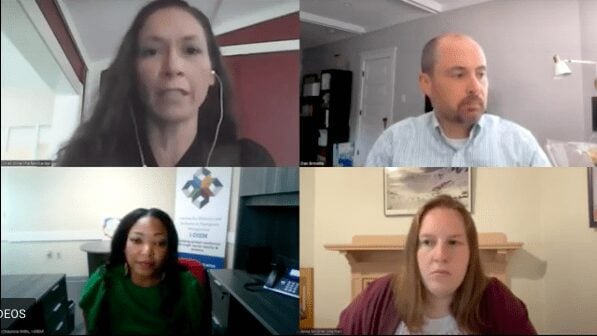
In the wake of climate change, investing in community-led and faith-based organizations and having more Black people in emergency management positions will help bring equity to emergency management, according to experts.
The Environmental and Energy Study Institute held a webinar July 14 to discuss how the federal government, states and cities can be more equitable when it comes to emergency management as climate change brings more frequent and severe disasters.
Natural disasters don’t discriminate, but Black people often experience the impact of inequitable recovery efforts, according to EESI. Ensuring equity in all steps of emergency management will result in more resilient communities that are better prepared for climate change, said Chauncia Willis, CEO of the Institute for Diversity and Inclusion in Emergency Management (I-DIEM). Achieving equity starts with knowing the history, Willis said.
“America has a history that has to be accounted for,” she said. “It’s impacting every aspect of our society and specifically in times of disaster, we are seeing the unfortunate impact of structural racism.”
I-DIEM was created “to interrupt the systems of inequity” by developing community-based programs and climate-adaptive projects. It came out of a need for more diversity in emergency management, Willis said.
Inequalities and systemic racism are behind many problems in emergency management and response to natural disasters, which results in disparities for underserved communities. Policies, plans and practices built on inequities, such as redlining, create more inequities and harmful systems, Willis said, and implementing plans that have a history of being inequitable only perpetuates more harm.
In 2018, more than half of employees at the Federal Emergency Management Agency (FEMA) were white men. Curtis Brown, an emergency management coordinator for Virginia, and co-founder of I-DIEM, told Congress in 2020 there needs to be more minority emergency managers because having their perspective will better serve communities by creating an understanding of grant writing, sustainability and mitigation efforts.
Providing communities with hands-on preparedness, mitigation and response training are a few examples of how communities can be better prepared for natural disasters and climate change, according to Willis. Focusing funding on local community organizations, and not the states, will also help solve the racial inequities in emergency management, Willis said.
When Hurricane Ida struck Louisiana in 2021,Traditional Tribal Chief of the Grand Caillou/Dulac Band of Biloxi-Chitimacha-Choctaw in Louisiana, Shirrel Parfait-Dardar, said her tribe assisted 56 families with home repairs and rebuilds with the help of nonprofits and faith-based organizations. Local law students assisted in handing out resources and filling out FEMA applications. There was no representation for her tribe in Louisiana, she said. The closest FEMA location was 45 minutes away for some.
Information is sparse within communities that need it the most, Parfait-Dardar said, so they often struggle to figure out where resources are during natural disasters. Not having access to information leads to longer recovery times, higher death tolls and more people being displaced.
“We need improved funding flow, direct community partners or nonprofits versus federal, state and local,” Parfait-Dardar said. “Many communities are involved in mitigation efforts in resiliency and adapt action projects and have been for many many generations.”
Most importantly, Black people and other minorities need to have positions in emergency management to help inform decision making.
“Unfortunately, for our communities, we have been cut out of those decision making processes and that has actually proven to be very detrimental,” Parfait-Dardar said. “It’s absolutely crucial that we begin to consider all voices because it is through diversity that we are going to be able to come up with solutions to these extremely diverse challenges that we are facing. We cannot do it alone. We are responsible to and for each other.”
Contact staff writer Jayden Kennett at 317-762-7847 or by email jaydenk@indyrecorder.com. Follow her on twitter @JournoJay.







